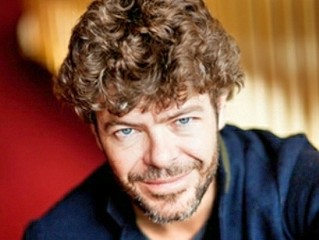|
Back
Post-Halloween Fantasias New York
Isaac Stern Auditorium, Carnegie Hall
11/06/2014 -
Henry Purcell: Suite from A Midsummer Night’s Dream
Peter Ilyich Tchaikovsky: The Tempest, opus 18
Luigi Dallapiccola: Piccola musica notturna
Felix Mendelssohn: Die erste Walpurgisnacht, opus 60
Elizabeth DeShong (Mezzo-soprano), Joseph Kaiser (Tenor), Luca Pisaroni (Bass-baritone)
Musica Sacra, Kent Tritle (Music Director), Orchestra of St. Luke’s, Pablo Heras-Casado (Principal Conductor)

P. Heras-Casado (© Orchestra of St. Luke’s)
Perhaps the Orchestra of St. Luke’s should change their name, since their concert last night was unabashedly Heathen.
In fact, as the major work had the chutzpah to call Christians “stupid” and to show Christian priests running away in cowardice, maybe the Klinghoffer-protestors should re-group. This time, they can threaten Carnegie Hall with taking away their financial largesse.
But how else to describe a concert of total fantasy, four pieces of music which depended upon drama (Shakespeare) and poetry both descriptive and comic (Antonio Machado and Johann Goethe)?
All of it pulled together by the dynamic, sprightly and picturesque conductor Pablo Heras-Casado, along with the unseen but always present conductor of Musica Sacra Chorus, Kent Tritle.
Whatever the playing, this was masterful programing. The concert started with a fantasy fairyland, ended with a magical Druid fire, and in between had Shakespeare’s mythical island, and a street which wasn’t a street at all but a dark metaphor of the soul.
That first fantasy came from a series of suites from Purcell’s The Fairy Queen, actually Titania from a version of Midsummer Night’s Dream, in the usual truncated rewriting of the 17th Century.
One wonders where his music would have taken him, had not Henry Purcell returned home drunk one night and had his shrewish wife not told him to sleep outside, where he caught the flu and died at the age of 35.
His fecundity was one thing. But the energy, the inventiveness and the pure bumptiousness of The Fairy Queen was taken at such a lively pace by the Maestro that it was obvious Purcell was one very original composer. He could have gone in any direction, and even his religious pieces were ceremonial and not terribly solemn. But here, the dances, the airs and the hornpipe–the latter of which Luciano Berio re-orchestrated–made for an ebullient beginning.
An ebullience which was almost extinguished by the following music to The Tempest by the young Tchaikovsky. The beginning was beautifully played, and the St. Luke’s first horn, Stewart Rose, played a series of fine solos. The strings, in this swirling maritime beginning were equally evocative.
Alas, Tchaikovsky devoted most of this piece to a love theme, à la his later Romeo and Juliet. The latter was equal to Shakespeare. Tempest’s love theme was mundane and long-winded, and–for the only time last night–slowed down an evening of excitement.
For the record, Tchaikovsky did redeem himself by giving Prospero a very Russian Boris Gudenov style motive. Shakespeare would have been shocked, but the exoticism was welcome here.
Luigi Dallapiccola’s Piccola musica notturna was a double pun, on Mozart’s night music, and perhaps the name of the composer. But the seriousness of the subject, a street at night, had the composer’s trademark lyricism, a simple three-note theme which rose and fell with the music. The dissonance was mild, the atmosphere was chilling, the orchestra played it...well, perhaps not with the color which, say the New York Phil would have given, but with the finesse and muted rapture.

K. Tritle (© www.kenttritle.com)
The grand surprise of the evening was a work by Mendelssohn, which parodied Christianity (Wagner might have snorted “Vunce a Jude, alvays a Jude”), but did it with the kind of zest which mirrored Purcell’s opening work.
Goethe’s original poem described a group of Druids, fearful that the Christians would take over their traditions, pulling a practical joke by pretending to be witches and hobgoblins to scare away the Christian priests and their followers.
With such a plot, the fake screams, the orchestral dissonances (which impressed Berlioz), and the huge choruses by the Druids had all the mock-fright of Gilbert and Sullivan’s Ruddigore. The secret was that Musica Sacra’s splendid chorus was conducted by the always splendid Kent Tritle, and they took their job very very seriously indeed.
Their choral work with the three soloists (one of whom, tenor Joseph Kaiser, was magnificent) was fine. But in their “fright chorus” of “Druids and Heathens” raised an almighty, most un-Mendelssohnian racket. And the final inspiring chorus, which included the composer’s later theme from the “Reformation” Symphony, had a true majesty.
No, this First Walpurgis Night was not a Night on Bald Mountain. But again, Mr. Heras-Casado started with such a dynamic overture and ended with Musica Sacra at its triumphant finest, so that comparisons would have been odious. All four pieces were individual, original, and vivid pictures, and both orchestra, chorus and conductors painted them with the primary colors which they deserved.
Harry Rolnick
|